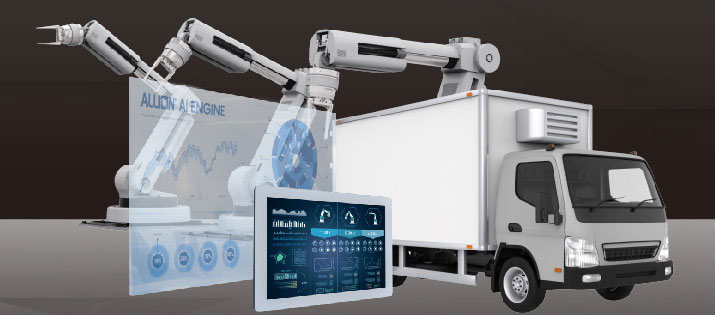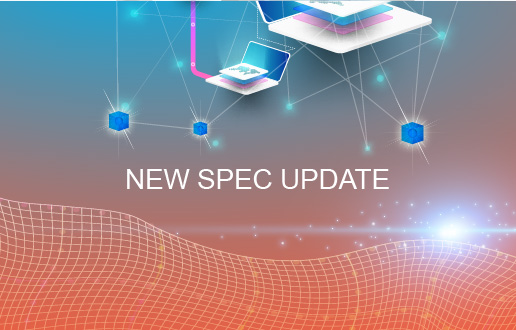Wi-Fi 6/6E vs Wi-Fi 7
This article provides an introduction to Wi-Fi 7, the latest Wi-Fi network communication protocol. Wi-Fi 7 achieves higher transmission speeds and provides less delays, meeting diverse application scenarios, which include: augmented reality (AR), virtual reality (VR), games, and cloud computing. By expanding on the basis of its predecessors, Wi-Fi 6/6E, Wi-Fi 7 significantly improves response capabilities and reliability. Its main new features include 320 MHz channels, 4K QAM, MLO Multi-link Operation (MLO), Multi-RU (Resource Units), and Puncturing.

Availability & Compatibility Issues
There are still few devices on the market capable of supporting Wi-Fi 7 chips since its recent launch in Q4 of 2023. Most consist of wireless network cards, mobile phones, and wireless routers. Allion purchased several devices that are capable of supporting Wi-Fi 7 from abroad, which include: Intel BE200NGW (wireless network card), ASUS ROG Phone 7 (mobile phone), Google Pixel 8 Pro (mobile phone), TP-Link Deco BE85 (AP), TP-link BE19000 (AP), ASUS RT- BE96U (AP), and NETGEAR Orbi 970 (AP). After connecting these devices, it was found that the ASUS ROG Phone 7 is only capable of connecting to the wireless router in 802.11 ax (Wi-Fi 6) mode; cannot connect to Wi-Fi 7 specifications. In terms of online performance, the Google Pixel 8 Pro is capable of being connected to Wi-Fi 7; connection is smooth with no problems. However, whilst the hardware specifications for currently commercially available products supports the latest standards, there is the possibility that future software updates will not be fully supported. Future updates will be required to support Wi-Fi 7, otherwise chip compatibility issues may occur with future generations. The consequence of this is the inability to connect to the Wi-Fi.
First look at Wi-Fi 7 performance
To test Wi-Fi 7’s performance, it was tested on Wi-Fi routers, mobile phones, and gaming laptops. Allion used the TP-link BE19000 tri-band Wi-Fi 7 router to test the Wi-Fi 7’s speed with the Google Pixel 8 Pro mobile phone and the Lenovo Legion series gaming laptop. To ensure there is no interference from external wireless signals affecting the performance of the transmission, Allion conducts their testing in a wireless, shielded room. The items tested include uploaded and downloaded data within the supported 2.4GHz/5GHz/6GHz frequency bands and different bandwidths.

Test Results
Allion provides the performance results of 2 devices in the 2.4GHz frequency band. Seeing as the Google Pixel 8 Pro’s 40MHz bandwidth does not support Wi-Fi 7, there is no corresponding test data. Wi-Fi 7’s actual upload and download speeds are similar to those of Wi-Fi 6. However, the value that is capable of being reached, 500Mbps, on the Lenovo system is provided and is very good.
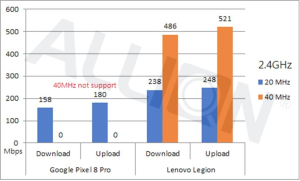
Next, it is necessary to understand the performance of the 5GHz band. When the bandwidth is 80MHz, both devices are capable of reaching a speed of 1000M. When the bandwidth is 160MHz, they are capable of reaching a speed of 2G. It is expected for the Notebook’s performance to be slightly better than that of the mobile phone. For downloading high-definition videos, the content is completed in nearly one minute; fast for video content.
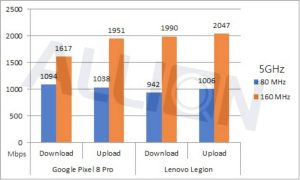
A highlight of the 6GHz band is the 320MHz bandwidth performance. Google phones do not currently support Wi-Fi 7; their data cannot be measured. However, the Lenovo Notebook exceeds the speed of 3G in terms of upload and download speeds. This performance is significantly greater than Wi-Fi 6’s speed.
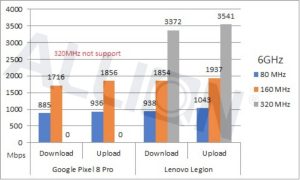
Presently, you are the first to receive Allion’s findings. During future testing, Allion will continue to share information on testing, providing data regarding other Wi-Fi 7 products.
Choose Allion Labs for your Wi-Fi Certification!
Allion supports customers in bringing Wi-Fi 7 products to market by relying on a variety of engineering testing technologies. With over 30 years of experience, they provide a wide range of professional consulting services. Allion is confident that they can provide the best quality control for your products in addition to reducing the frequency of consumer complaints.
Faster
Wi-Fi 7 provides early verification in the initial stages of product development (EVT/DVT) to confirm product quality, speeding up the development process through flexible scheduling and testing support.
Easier
Allion understands the situation and clarifies problems over the phone, providing you with the data necessary to reduce communication delays. Problems are also resolved face-to-face, or by going directly to Allion’s website.
Better
Allion is capable of providing you with strong technical support. Equipped with certifications and verifications that include: Wi-Fi, Bluetooth, Matter, Thread, BBF TR-398, etc., and user experience optimization suggestions that go beyond certification testing, your technology will receive the best treatment.
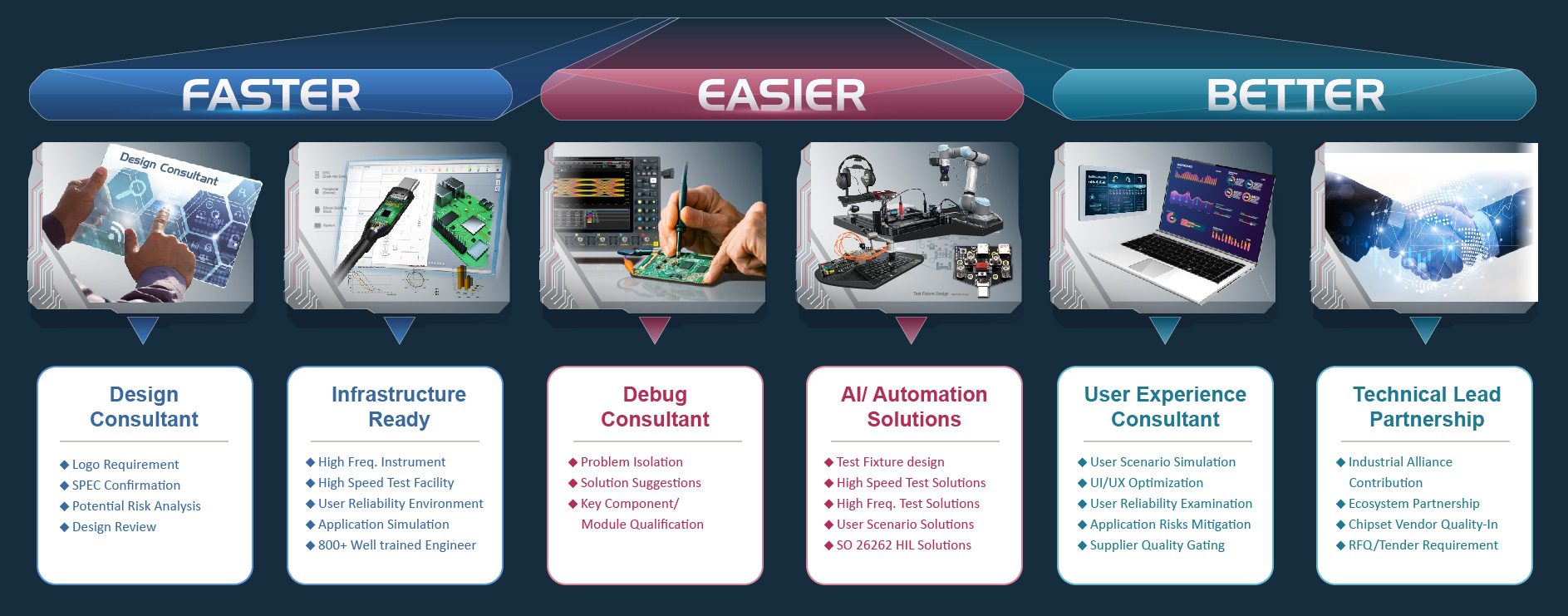
For more information about wireless product consulting services, or other wireless technology verification services, please feel free to contact Allion for a consultation.











